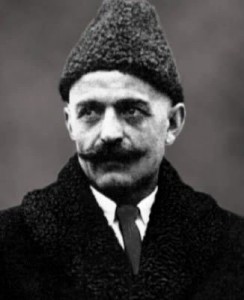Today we commemorate the death of the prophet and gnostic George Ivanovich Gurdjieff, who died on this day in 1949 in Neuilly, near Paris, surrounded by a large group of sobbing followers. Somewhat like William Blake’s notion of having been a ‘sent man’, Gurdjieff was throughout his life obsessed with what he called his ‘Being Duty’, his unyielding belief that his role was to serve others by lending them his expertise in navigating the great problems of life. He had spent decades pushing already gifted people to reach even greater heights in their lives, founded and run Renaissance schools of enlightenment that united the rigorously physical with the highly intellectual, wowed effète New York audiences with the sheer audacity of his outrageous dance troupes’ incendiary manouevres, and throughout it all engaged in a life of such mystery that some conspiracy theorists still suspect him of having been a Russian spy, a rumour which Gurdjieff – always the self-mythologizer – was extremely slow to deny.
Born in Armenia’s second city Alexandropol some time in the mid-1860s, the young Gurdjieff grew up listening to songs sung by his father, who was an ashokh, or bard. Among the songs was a tale from the Epic of Gilgamesh, so when Gurdjieff learned that the epic had been discovered carved on to stone tablets in the Assyrian city of Nineveh, the young boy was thrilled to imagine that his father’s song could have been handed down over thousands of years. Reinforced by this suspicion that very ancient culture could still be all around him, Gurdjieff systematically set about learning all that he could about religions, the occult and magic in an effort to discover their common bond. And it was this extraordinary combination of the esoteric and the religious that was to gain Gurdjieff such favour when he brought his ideas to the West.
But whilst it was Gurdjieff’s pragmatism, and the sheer usefulness of so much of his work that had kept me personally enthralled these past decades, it was the enduring mystery of Gurdjieff’s personal life that obliged me to travel to Armenia, in 2003CE, in order to search for the Ur-spirit that his work exuded. I’d long ago heard tales of how Gurdjieff would travel with followers to the foothills below Mt. Ararat, disappearing for hours at a time to restore himself at the megalithic burial chambers, or dolmens, that clung to the steep hillsides. But it was only when I journeyed to those dolmens myself that I finally understood George Gurdjieff’s worldview. For there in Christian Armenia, hemmed in by Muslim Iran, Turkey and Azerbaijan, I stood on the Mithraic hill on which Noah was said to have sacrificed the lamb when the Waters of the Flood subsided, rubbed the bloody sacrificial stone with my own fingers and stared out upon twin-peaked Ararat, where the ark is said to have rested. There the worldview of George Gurdjieff unfolded in all its mystery before me, a vast tapestry – incorporating thousands of years of enlightened ideas – still being embroidered right there in 2003CE. Such a deep repository of ancient traditions for Gurdjieff to draw upon. Why, for a great shaman such as he, merely getting his rich message out of Armenia was guaranteed to make a World Figure of him.
[Written by Julian Cope]



3 Responses to 29th October 1949 – the Death of George Gurdjieff